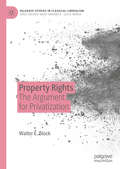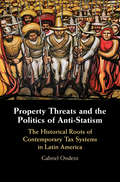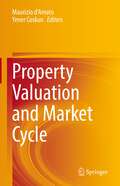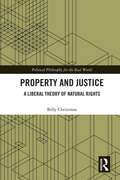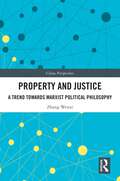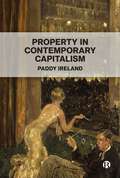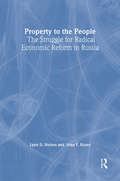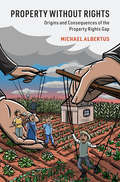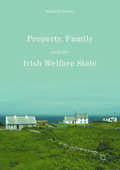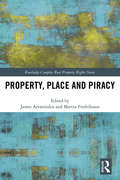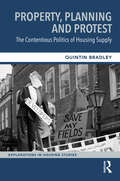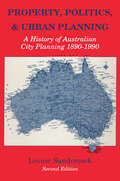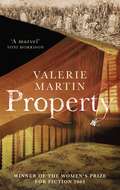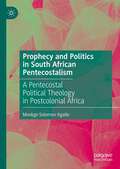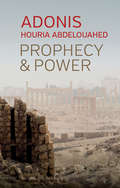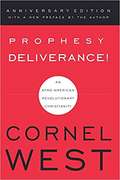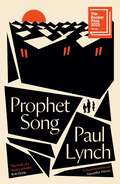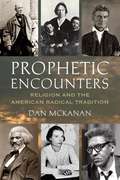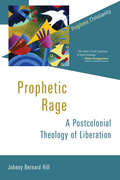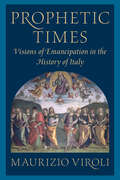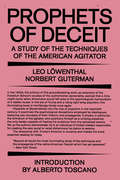- Table View
- List View
Property Rights: The Argument for Privatization (Palgrave Studies in Classical Liberalism)
by Walter E. BlockIn this timely book, Walter E. Block uses classical liberal theory to defend private property rights. Looking at how free enterprise, capitalism and libertarianism are cornerstones of economically prosperous civilizations, Block highlights why private property rights are crucial. Discussing philosophy, libertarian property rights theory, reparations and other property rights issues, this volume is of interest to academics, students, journalists and all those interested in this integral aspect of political economic philosophy.
Property Threats and the Politics of Anti-Statism: The Historical Roots of Contemporary Tax Systems in Latin America
by Gabriel OndettiTax revenues have risen robustly across Latin America in recent decades, casting doubt on the region's reputation for having states too poor to finance economic and social development. However, dramatic differences persist in the magnitude of national tax burdens and public sector size, even among seemingly similar countries. This book examines the historical roots of this variation. Through in-depth case studies of Argentina, Brazil, Chile, and Mexico, as well as evidence from Ecuador and Guatemala, Ondetti reveals the lasting impact of historical episodes of redistributive reform that threatened property rights. Ironically, where such episodes were most extensive, they hindered future taxation by prompting economic elites and social conservatives to mobilize politically against state intervention, forming peak business associations, rightist parties, and other formal and informal organizations that have proven to be remarkably enduring.
Property Valuation and Market Cycle
by Maurizio D’Amato Yener CoskunThis book discusses the role of the property market cycle in real estate valuation. Challenging traditional property valuation methods that rely on current market conditions and economic trends, this book argues for a re-evaluation of the relationship between property valuation and cycles in property markets. The book is divided into two parts. The first part gathers research on property market cycle analysis and the delicate problems dealing with property market information including the development of the real estate market index, appraisal bias, and the use of time series in plotting the market cycle. The second part proposes several possible modifications to the traditional income approach methodologies, including cyclical capitalization and the hedonic price method. Furthermore, this part also addresses the need for amendments to current s property valuation standards and institutional regulations. Written by an international cross-section of expert voices in market cycles and property valuation, the book is a comprehensive resource for any researcher or upper-level student studying economic volatility.
Property and Justice: A Liberal Theory of Natural Rights (Political Philosophy for the Real World)
by Billy ChristmasThis book gives an account of a full spectrum of property rights and their relationship to individual liberty. It shows that a purely deontological approach to justice can deal with the most complex questions regarding the property system. Moreover, the author considers the economic, ecological, and technological complexities of our real-world property systems. The result is a more conceptually sound account of natural rights and the property system they demand. If we think that liberty should be at the centre of justice, what does that mean for the property system? Economists and lawyers widely agree that a property system must be composed of many different types of property: the kind of private ownership one has over one’s person and immediate possessions, as well as the kinds of common ownership we each have in our local streets, as well as many more. However, theories of property and justice have not given anything approaching an adequate account of the relationship between liberty and any other form of property other than private ownership. It is often thought that a basic commitment to liberty cannot really tell us how to arrange the major complexities of the property system, which diverge from simple private ownership. Property and Justice demonstrates how philosophical rigour coupled with interdisciplinary engagement enables us to think clearly about how to deal with real-world problems. It will be of interest to political philosophers, political theorists, and legal theorists working on property rights and justice.
Property and Justice: A Trend Towards Marxist Political Philosophy (China Perspectives)
by Zhang WenxiThis book attempts to answer the question “what on earth is the Marxist political philosophy?” The author discusses Karl Marx's vision of the good life and the good society, focusing in particular on the interrelationship between property and justice. Strictly speaking, the subject of the present book should not be placed within an a priori conceptual framework, which essentially focuses on academic notions of the good society, good government and justice. However, for the purposes of this book, Marxist political philosophy, namely communism, is already embodied in two aspects. This book argues that it is the noisy and confusing modern political philosophy that obscures the actualisation of human nature unfolded by the Marxist political philosophy before us. The book will be essential reading for students and scholars of philosophy, Marxism, Chinese studies and Chinese Marxist philosophy.
Property and Political Order in Africa
by Catherine BooneIn sub-Saharan Africa, property relationships around land and access to natural resources vary across localities, districts and farming regions. These differences produce patterned variations in relationships between individuals, communities and the state. This book captures these patterns in an analysis of structure and variation in rural land tenure regimes. In most farming areas, state authority is deeply embedded in land regimes, drawing farmers, ethnic insiders and outsiders, lineages, villages and communities into direct and indirect relationships with political authorities at different levels of the state apparatus. The analysis shows how property institutions - institutions that define political authority and hierarchy around land - shape dynamics of great interest to scholars of politics, including the dynamics of land-related competition and conflict, territorial conflict, patron-client relations, electoral cleavage and mobilization, ethnic politics, rural rebellion, and the localization and 'nationalization' of political competition.
Property and Political Theory
by Alan RyanVentures into the relationship between work and property. Property And Political Theory covers the following subtopics, Locke, Labour and the Purposes of God Rousseau and Progress Kant and Possession The Utilitarians: Security and Equality Hegel and Mastering the World Mill and Marx and Socialism Why Are There So Few Socialists?
Property in Contemporary Capitalism
by Paddy IrelandAmid the shift towards neoliberalism and the privatization of resources, this book provides a radical new lens to view property and property theory. Boldly challenging the conventional theories of property law that have shaped our understanding for centuries, leading expert Paddy Ireland explores the rise and growth of new intangible property forms; the nature of ‘investment’ and of property-as-capital; and the empirical realities of modern property. Raising broader questions about ownership in society, the author ignites a powerful conversation about the increasingly unequal distribution of wealth, forcing us to confront that our current property system bears considerable responsibility for the current ‘polycrisis. This groundbreaking work will set the agenda for a new era in property theory.
Property to the People: The Struggle for Radical Economic Reform in Russia
by Julie Nelson Irina Y. KuzesThis text sets Russia's current economic transformation in the context of economic and political change, and provides an overview of issues central to the economic reform debate in Russia. It also highlights the human dimension of large-scale economic change through case studies and interviews.
Property without Rights: Origins and Consequences of the Property Rights Gap (Cambridge Studies in Comparative Politics)
by Michael AlbertusMajor land reform programs have reallocated property in more than one-third of the world's countries in the last century and impacted over one billion people. But only rarely have these programs granted beneficiaries complete property rights. Why is this the case, and what are the consequences? This book draws on wide-ranging original data and charts new conceptual terrain to reveal the political origins of the property rights gap. It shows that land reform programs are most often implemented by authoritarian governments who deliberately withhold property rights from beneficiaries. In so doing, governments generate coercive leverage over rural populations and exert social control. This is politically advantageous to ruling governments but it has negative development consequences: it slows economic growth, productivity, and urbanization and it exacerbates inequality. The book also examines the conditions under which subsequent governments close property rights gaps, usually as a result of democratization or foreign pressure.
Property, Family and the Irish Welfare State
by Michelle NorrisThis book examines the long-term development of the Irish welfare state since the late 19th Century. It contests the consensus view that Ireland, like other Anglophone countries, has historically operated a liberal welfare regime which forces households to rely mainly on the market to maintain their standard of living. Drawing on case studies and key statistical data, this book argues that the Irish welfare state developed differently from most other Western European countries until recent decades. Norris' original line of argument makes the case that Ireland's regime was distinctive in terms of both focus and purpose in that Ireland's welfare state was shaped by the power of small farmers and moral teaching and intended to support a rural, agrarian and familist social order rather than an urban working class and industrialised economy. A well-researched and methodical study, this book will be of great interest to scholars of social policy, sociology, and Irish history.
Property, Place and Piracy (Routledge Complex Real Property Rights Series)
by Martin Fredriksson James ArvanitakisThis book takes the concept of piracy as a starting point to discuss the instability of property as a social construction and how this is spatially situated. Piracy is understood as acts and practices that emerge in zones where the construction and definition of property is ambiguous. Media piracy is a frequently used example where file-sharers and copyright holders argue whether culture and information is a common resource to be freely shared or property to be protected. This book highlights that this is not a dilemma unique to immaterial resources: concepts such as property, ownership and the rights of use are just as diffuse when it comes to spatial resources such as land, water, air or urban space. By structuring the book around this heterogeneous understanding of piracy as an analytical perspective, the editors and contributors advance a trans-disciplinary and multi-theoretical approach to place and property. In doing so, the book moves from theoretical discussions on commons and property to empirical cases concerning access to and appropriation of land, natural and cultural resources. The chapters cover areas such as maritime piracy, the philosophical and legal foundations of property rights, mining and land rights, biopiracy and traditional knowledge, indigenous rights, colonization of space, military expansionism and the enclosure of urban space. This book is essential reading for a variety of disciplines including indigenous studies, cultural studies, geography, political economy, law, environmental studies and all readers concerned with piracy and the ambiguity of property.
Property, Planning and Protest: The Contentious Politics of Housing Supply (Explorations in Housing Studies)
by Quintin BradleyThe struggle for the right to housing is a battle over property rights and land use. For housing to be provided as a human need, land must be recognised as a common right. Property, Planning and Protest is a compelling new investigation into public opposition to housing and real estate development. Its innovative materialist approach is grounded in the political economy of land value, and it recognises the conflict between communities and real estate capital as a struggle over land and property rights. Property, Planning and Protest is about a social movement struggling for democratic representation in land-use decisions. The amenity groups it describes champion a democratic plan-led system that allocates land for social and environmental goals. Situating this movement in a history of land reform and common rights, this book sets out a persuasive new vision of democratic planning and affordable housing for all.
Property, Politics, and Urban Planning: A History of Australian City Planning 1890-1990
by Leonie SandercockThis text on the origins and history of city planning in Australian cities covers the emergence of the Town Planning Movement, and planning from the nineteenth century through to the post-1980s period. Looking at the cities of Adelaide, Melbourne and Sydney.
Property, Predation, and Protection
by Stanislav MarkusWhat threatens the property rights of business owners - and what makes these rights secure? This book transcends the conventional diagnosis of the issue in modern developing countries by moving beyond expropriation by the state ruler or by petty bureaucratic corruption. It identifies "agent predation" as a novel threat type, showing it to be particularly widespread and detrimental. The book also questions the orthodox prescription: institutionalized state commitment cannot secure property rights against agent predation. Instead, this volume argues that business actors can hold the predatory state agents accountable through firm-level alliances with foreign actors, labor, and local communities. Beyond securing ownership, such alliances promote rule of law in a rent-seeking society. Taking Russia and Ukraine between 2000 and 2012 as its empirical focus, the book advances these arguments by drawing on more than 150 qualitative interviews with business owners, policy makers, and bureaucrats, as well as an original large-N survey of firms.
Property: Winner of the Women's Prize for Fiction (Vintage Contemporaries Ser.)
by Valerie MartinWINNER OF THE WOMEN'S PRIZE FOR FICTION 2003Manon Gaudet is unhappily married to the owner of a Louisiana sugar plantation. She misses her family and longs for the vibrant lifestyle of her native New Orleans, but most of all, she longs to be free of the suffocating domestic situation. The tension revolves around Sarah, a slave girl who may have been given to Manon as a wedding present from her aunt, whose young son Walter is living proof of where Manon's husband's inclinations lie. This private drama is being played out against a brooding atmosphere of slave unrest and bloody uprisings. And if the attacks reach Manon's house, no one can be sure which way Sarah will turn . . .Beautifully written, PROPERTY is an intricately told tale of both individual stories and of a country in a time of change, where ownership is at once everything and nothing, and where belonging, by contrast, is all.
Prophecy and Politics in South African Pentecostalism: A Pentecostal Political Theology in Postcolonial Africa
by Mookgo Solomon KgatleThis book is an interdisciplinary study of the relationship between prophecy and politics in South African Pentecostalism. The role and the power of prophecy in enhancing the presence of politicians in the church square are unpacked through historical examples, as well as case studies of contemporary prophets. Solomon Kgatle argues that the influence of prophecy in politics has the potential to weaken the prophetic voice of the church in general and the Pentecostal movement in particular. He proposes a Pentecostal political theology of prophecy. This theology is developed by taking into cognizance the theoretical and theological frameworks of prophetic imagination and pneumatological imagination. In addition, this theology seeks a balance between prophecy and power and prophecy and sovereignty.
Prophecy and Power: Violence and Islam II
by Adonis Houria AbdelouahedHeralded as the greatest living Arab poet, Syrian-born Adonis is also a staunch critic of violence and despotism in the Islamic world. In this book, he explores the nature of political power in Islam by focusing on the figure of the prophet Mohammed as both a political and a mythical leader. In conversation with Houria Abdelouahed, Adonis examines the Qur’anic intervention in establishing the prophet’s power, especially when the text is read based on faith and not reason. The authors discuss the historical developments before and after the prophet’s death, which established the power of the Caliph or the leader as absolute. The second part of the book examines the consequences of these developments in the Arab and Islamic world today, where this ‘tyrannical’ understanding of power continues to hold sway. The authors conclude with a call for secularism in the Arab world and a passionate plea for the separation of religion from the political, legal and social spheres.
Prophecy without Contempt: Religious Discourse in the Public Square
by Cathleen KavenyThe culture wars have as much to do with rhetorical style as moral substance. Cathleen Kaveny focuses on a powerful stream of religious discourse in American political speech: the Biblical rhetoric of prophetic indictment. It can be strong medicine against threats to the body politic, she shows, but used injudiciously it does more harm than good.
Prophesy Deliverance!: An Afro-American Revolutionary Christianity
by Cornel WestIn this, his premiere work, Cornel West provides readers with a new understanding of the African American experience based largely on his own political and cultural perspectives borne out of his own life's experiences. He challenges African Americans to consider the incorporation of Marxism into their theological perspectives, thereby adopting the mindset that it is class more so than race that renders one powerless in America. Armed with a new introduction by the author, this Twentieth Anniversary Edition of Prophesy Deliverance! is a must have.
Prophet Song: WINNER OF THE BOOKER PRIZE 2023
by Paul LynchWINNER OF THE BOOKER PRIZE 2023 WINNER OF THE 2024 DAYTON LITERARY PEACE PRIZE * SHORTLISTED FOR THE AN POST IRISH BOOK OF THE YEAR 2023 * SHORTLISTED FOR THE STREGA EUROPEAN PRIZE * SHORTLISTED FOR THE DUBLIN LITERARY AWARD A SUNDAY TIMES BESTSELLER A NEW YORK TIMES EDITOR'S CHOICE AN AMAZON TOP 10 BOOK OF DECEMBER 2023 A Book of the Year for 2023 according to the Guardian, FT, Irish Independent, Irish Examiner, Sunday Independent, Economist, Big Issue, Daily Telegraph, Irish Times and Waterstones 'A CRUCIAL BOOK FOR OUR CURRENT TIMES... BRILLIANTLY HAUNTING.' OBSERVER The explosive literary sensation: a mother faces a terrible choice as Ireland slides into totalitarianism On a dark, wet evening in Dublin, scientist and mother-of-four Eilish Stack answers her front door to find the GNSB on her step. Two officers from Ireland&’s newly formed secret police are here to interrogate her husband, Larry, a trade unionist. Ireland is falling apart. The country is in the grip of a government turning towards tyranny and when her husband disappears, Eilish finds herself caught within the nightmare logic of a society that is quickly unravelling. Soon, she must decide just how far she is willing to go to keep her family safe. Exhilarating, terrifying and propulsive, Paul Lynch's Booker Prize-winning novel is a devastating vision of a country falling apart and a moving portrait of the resilience of the human spirit when faced with the darkest of times. 'A compassionate, propulsive and timely novel that forces the reader to imagine — what if this was me?' FT
Prophetic Encounters: Religion and the American Radical Tradition
by Dan MckananThough in recent years the religious right has been a powerful political force, making "religion" and "conservatism" synonymous in the minds of many, the United States has always had an active, vibrant, and influential religious Left. In every period of our history, people of faith have envisioned a society of peace and justice, and their tireless efforts have made an indelible mark on our nation's history. In Prophetic Encounters, Dan McKanan challenges simple distinctions between "religious" and "secular" activism, showing that religious beliefs and practices have been integral to every movement promoting liberty, equality, and solidarity. From Frederick Douglass, John Brown, and Elizabeth Cady Stanton in the nineteenth century to Dorothy Day, Martin Luther King Jr., and Starhawk in the twentieth, American radicals have maintained a deep faith in the human capacity to transform the world. This radical faith has always been intertwined with the religious practices of Christians and Jews, pagans and Buddhists, orthodox believers and humanist heretics. Their vision and energies powered the social movements that have defined America's progress: the abolition of slavery, feminism, the New Deal, civil rights, and others. In this groundbreaking, definitive work, McKanan treats the histories of religion and the Left as a single history, showing that American radicalism is a continuous tradition rather than a collection of disparate movements. Emphasizing the power of encounter--encounters between whites and former slaves, between the middle classes and the immigrant masses, and among activists themselves--McKanan shows that the coming together of people of different perspectives and beliefs has been transformative for centuries, uniting those whose faith is a source of activist commitment with those whose activism is a source of faith. Offering a history of the diverse religious dimensions of radical movements from the American Revolution to the present day, Prophetic Encounters invites contemporary activists to stand proudly in a tradition of prophetic power.
Prophetic Rage: A Postcolonial Theology Of Liberation (Prophetic Christianity Series (PC))
by Johnny Bernard HillIn this book Johnny Bernard Hill argues that prophetic rage, or righteous anger, is a necessary response to our present culture of imperialism and nihilism. The most powerful way to resist meaninglessness, he says, is refusing to accept the realities of structural injustice, such as poverty, escalating militarism, genocide, and housing discrimination.Hill’s Prophetic Rage is interdisciplinary, integrating art, music, and literature with theology. It is constructive, passionate, and provocative. Hill weaves through a myriad of creative and prophetic voices of protest -- from Jesus to W. E. B. DuBois, Martin Luther King Jr., Malcolm X, and President Barack Obama -- as well as multiple approaches, including liberation theology and black religion, to reflect theologically on the nature of liberation, justice, and hope on contemporary culture.
Prophetic Times: Visions of Emancipation in the History of Italy
by Maurizio ViroliThroughout Italy's history, prophetic voices-poets, painters, philosophers-have bolstered the struggle for social and political emancipation. These voices denounced the vices of compatriots and urged them toward redemption. They gave meaning to suffering, helping to prevent moral surrender; they provided support, with pathos and anger, which set into motion the moral imagination, culminating in redemption and freedom. While the fascist regime attempted to enlist Mazzini and the prophets of the Risorgimento in support of its ideology, the most perceptive anti-fascist intellectual and political leaders composed eloquent prophetic pages to sustain the resistance against the totalitarian regime. By the end of the 1960s, no prophet of social emancipation has been able to move the consciences of the Italians. In this Italian story, then, is our story, the world's story, inspiration for social and political emancipation everywhere.
Prophets of Deceit: A Study of the Techniques of the American Agitator (Paperbounds Ser. #No. Pb-8)
by Norbert Guterman Leo LowenthalHow authoritarian and racist discourse functionsA classic book that analyzes and defines media appeals specific to American pro-fascist and anti-Semite agitators of the 1940s, such as the application of psychosocial manipulation for political ends. The book details psychological deceits that idealogues or authoritarians commonly used. The techniques are grouped under the headings "Discontent", "The Opponent", "The Movement" and "The Leader". The authors demonstrate repetitive patterns commonly utilized, such as turning unfocused social discontent towards a targeted enemy. The agitator positions himself as a unifying presence: he is the ideal, the only leader capable of freeing his audience from the perceived enemy. Yet, as the authors demonstrate, he is a shallow person who creates social or racial disharmony, thereby reinforcing that his leadership is needed. The authors believed fascist tendencies in America were at an early stage in the 1940s, but warned a time might come when Americans could and would be "susceptible to ... [the] psychological manipulation" of a rabble rouser. A book once again relevant in the Trump era, as made clear by Alberto Toscano's new introduction.
